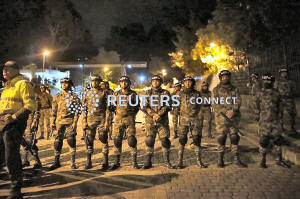Three Colombia police killed in bombing after thousands gather for
renewed protests
 Send a link to a friend
Send a link to a friend
 [November 23, 2019]
By Julia Symmes Cobb and Nelson Bocanegra [November 23, 2019]
By Julia Symmes Cobb and Nelson Bocanegra
BOGOTA (Reuters) - Three police were killed
in a bomb blast late on Friday at a police station in Colombia, after
thousands gathered for renewed protests and sporadic looting erupted in
the capital Bogota.
A police source told Reuters 10 officers were also injured in the
explosion, in the town of Santander de Quilichao in the southwestern
province of Cauca, known as a hot spot for drug trafficking and
violence.
The source did not attribute the bombing to a particular armed group.
Police are expected to hold a news conference on Saturday morning.
Three people were killed on Thursday as more than 250,000 people marched
in a national strike to express growing discontent with President Ivan
Duque's government.

Their grievances included rumored economic reforms that the president
has denied and anger at what protesters call a lack of government action
to stop corruption and the murder of human rights activists.
Thousands gathered on Friday afternoon in Bogota's Bolivar Plaza for a "cacerolazo"
- a traditional Latin American expression of protest in which people
bang pots and pans.
"We are here to keep protesting against the Duque government," said
25-year-old art student Katheryn Martinez, as she clanged a pot with a
fork accompanied by her father Arturo, 55.
"It's an inefficient government that kills children and doesn't
acknowledge it," she said, referring to a recent bombing targeted at
rebels that killed eight teenagers and prompted the former defense
minister to resign.
The crowd, which included families and elderly people, was abruptly
dispersed by tear gas, sending protesters running up the steep narrow
streets of the historic district.
Some protesters regrouped at nearby intersections and continued
chanting, while people in other neighborhoods gathered in celebratory
cacerolazos, temporarily blocking some roads.
A 9 p.m. curfew is in force across Bogota, except for the neighborhoods
of Bosa, Kennedy and Ciudad Bolivar, where it began at 8 p.m.
Posts on social media and callers into radio stations said neighbors
were organizing to protect homes from looters, while officials urged
calm.
Several supermarkets in the city's south were looted on Friday as
protesters, many masked, burned items in the street and blocked roads.
Other protesters stole a public bus.
[to top of second column]
|

Military personnel stand guard during a protest on the second day of
a national strike in Bogota, Colombia, November 22, 2019.
REUTERS/Luisa Gonzalez

Some people were taking advantage of the protests to "sow chaos",
Duque said in a televised address on Friday evening.
"From next week I will start a national conversation that will
strengthen the current agenda of social policies," Duque said.
He added that dialogue would "permit us to close social gaps, fight
corruption more effectively and build, between all of us, peace with
legality."
The three deaths on Thursday in Valle del Cauca province were being
investigated, Defense Minister Carlos Holmes Trujillo told
journalists on Friday.
He said authorities had confirmed two deaths in Buenaventura and one
in Candelaria, adding that a group of people had tried to loot the
Viva Buenaventura mall.
"As a result of the confrontation between vandals and security
forces and in events that are the subject of investigation by the
attorney general's office, two people were killed," he said.
Though the vast majority of Thursday's marchers participated
peacefully, 98 people were arrested, while 122 civilians and 151
members of the security forces were injured, he said.
Authorities launched 11 preliminary investigations into security
forces' misconduct, Trujillo added, after social media images of
protesters' rough treatment by police, including one kicked in the
face.

The protests have coincided with demonstrations elsewhere in Latin
America, from anti-austerity marches in Chile, to protests over
vote-tampering allegations in Bolivia that led President Evo Morales
to resign, and inflamed tensions in Ecuador and crisis-hit
Nicaragua.
(Reporting by Julia Symmes Cobb, Nelson Bocanegra and Luis Jaime
Acosta; Editing by Bill Berkrot and Daniel Wallis)
[© 2019 Thomson Reuters. All rights
reserved.]
Copyright 2019 Reuters. All rights reserved. This material may not be published,
broadcast, rewritten or redistributed.
Thompson Reuters is solely responsible for this content. |